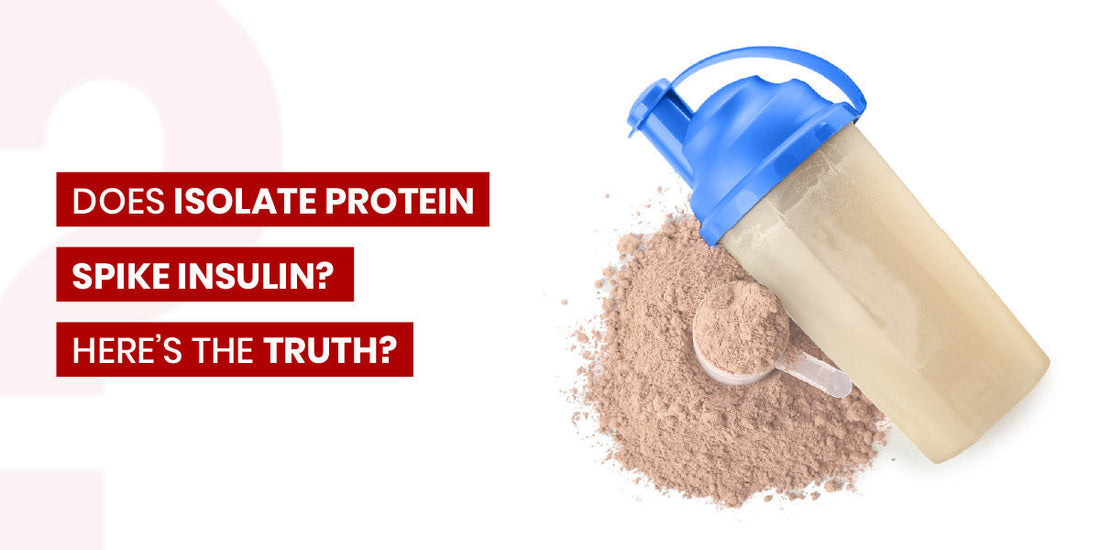
Does Isolate Protein Spike Insulin? The Truth You Need to Know
byWhey isolate protein is a go-to supplement for athletes, fitness enthusiasts, and those on weight loss journeys. But a common question that often surfaces is:
“Does isolate protein spike insulin?”
This concern is especially relevant for people managing blood sugar levels, following a ketogenic diet, or aiming for better metabolic health. In this article, we break down the science behind protein and insulin, how whey isolate fits into the picture, and whether it's something to be cautious about.
What Is Whey Isolate Protein?
Whey protein isolate (WPI) is an extensively purified variant of whey, comprising 90% or greater protein content by weight, along with negligible amounts of lactose, fat, and carbohydrates. It’s fast-digesting and rich in branched-chain amino acids (BCAAs), especially leucine, which triggers muscle protein synthesis.
Because of its purity and digestibility, whey isolate is popular for:
- Post-workout recovery
- Muscle maintenance during weight loss
- Lactose-sensitive individuals
Does Whey Isolate Protein Spike Insulin?
Yes, but it's not what you think—and not a bad thing.
Studies show that whey protein does cause a mild insulin response, even though it's low in carbohydrates. This happens because:
- Certain amino acids (especially leucine) are insulinogenic.
- Whey protein encourages the secretion of incretin hormones such as GLP-1 and GIP, which subsequently enhance insulin release.
But here’s the key point:
The insulin response is balanced, inherent, and facilitates the transport of nutrients such as glucose and amino acids into your muscles for the purposes of recovery and repair.
Why an Insulin Spike Isn’t Always Bad
Insulin is often misunderstood. While chronically high insulin levels can be problematic (e.g., in insulin resistance or type 2 diabetes), a short-term, post-meal spike is normal and necessary.
Benefits of insulin after whey protein:
- Enhances muscle protein synthesis
- Reduces muscle breakdown
- Helps refill glycogen stores when taken with carbs
- Improves nutrient absorption
In fact, many bodybuilders and athletes use whey protein precisely because of its ability to spike insulin post-workout—when your muscles are most receptive.
Whey Isolate vs. Carbs: Which Spikes Insulin More?
Whey isolate does trigger insulin, but not nearly as much as a high-carb or sugary meal.
|
Nutrient |
Glycemic Response |
Insulin Response |
|
White Bread |
High |
High |
|
Whey Isolate |
Low |
Moderate |
|
Casein Protein |
Low |
Low |
|
Oats |
Medium |
Medium |
So, if you’re concerned about blood sugar or insulin spikes, whey isolate is far better than most carbs.
What About Low-Carb, Keto, or Diabetic Diets?
If you're following a:
- Ketogenic diet
- Low-carb lifestyle
- Diabetic meal plan
You may still incorporate whey isolate, albeit in moderation.
Since whey isolate has minimal carbs and only a modest insulin response, it won’t kick you out of ketosis or cause blood sugar crashes—unless combined with high-GI foods.
Tip: Pair it with healthy fats or fiber for more balanced absorption.
Should You Avoid Whey Isolate Because of Insulin?
Absolutely not.
Unless advised by a medical professional, most healthy individuals benefit from the mild insulin response caused by isolate protein—especially after a workout.
If your goal is:
- Muscle gain
- Fat loss
- Faster recovery
- Better metabolism
...then whey isolate is not only safe, but also helpful.
Key Takeaways
- Yes, whey isolate spikes insulin mildly, due to amino acids and hormone response.
- The release of insulin is a natural process that is advantageous for muscle development and recovery.
- It’s a low-GI option and safer than most carb-heavy foods.
Ideal for a wide range of individuals, including those who follow low-carb diets and those focused on fitness.
Conclusion
Whey isolate protein does spike insulin—but in a good way.
Unless you have a specific medical condition requiring strict insulin control, you have nothing to worry about. In fact, the post-protein insulin response helps shuttle nutrients into your muscles for better performance and recovery.
So go ahead and enjoy that clean scoop of whey isolate—it’s doing your body more good than harm.









